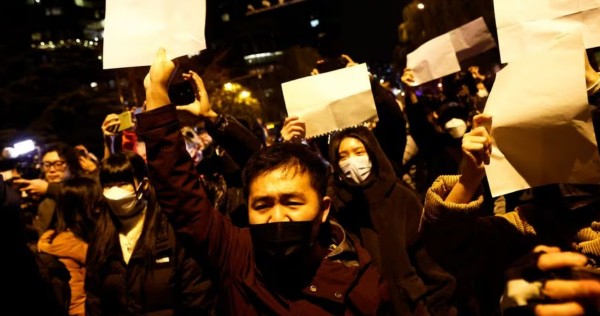



In a country where public dissent is heavily monitored and controlled, the one-year anniversary of the protests against Covid restrictions in China brings mixed emotions for participants. While the demonstrations played a role in ending some of the restrictions, they ultimately failed to bring about lasting political change. Many participants now fear that the protests will be forgotten due to state censorship [deed2eb0].
The protests, which took place in response to China's harsh 'zero Covid' policy and growing authoritarianism under President Xi Jinping, briefly challenged the authority of the Communist Party. However, the government swiftly cracked down on the protests, arresting participants and tightening control over Covid-19 measures. The total number of protesters detained last year remains unknown, and some participants continue to face harassment and detention as a result of their involvement [98c4477f].
Despite the risks, the protests did raise awareness of the political power held by the Chinese people. They demonstrated that even in a heavily controlled society, individuals can come together to voice their grievances and demand change. The anniversary of the protests was not marked by large-scale demonstrations in Beijing and Shanghai, where security measures are particularly tight, but commemorative events were held in cities with large Chinese communities overseas [deed2eb0].
However, there is a sense of ambivalence among participants when reflecting on the protests. Some feel a sense of civic awareness and the need to protect their rights, while others are hesitant to publicly commemorate the protests. Security concerns and a general unwillingness to revisit memories of the pandemic contribute to this ambivalence. State censorship also plays a role in suppressing public discussion and remembrance of the protests [deed2eb0][af8df649].
Despite the mixed emotions and challenges faced by participants, the protests have had a lasting impact. They have sparked small-scale acts of subversion and have fostered a sense of solidarity among participants. While the protests may not have achieved their intended political change, they have shown that even in the face of repression, the desire for freedom and justice persists [af8df649].
Three new books explore suppressed histories in modern China, from the Cultural Revolution to the Covid pandemic. The Chinese government attempts to control history and construct an unbroken myth of the Chinese nation. The books delve into the aftermath of the Cultural Revolution, the resistance against the state's monopoly on history, and the Covid pandemic. They raise fundamental questions about life, its meaning, and responsibilities. Monuments and history serve different purposes in China, with Tiananmen Square being a monument to Mao Zedong. The Cultural Revolution is not entirely taboo to discuss in China, but the blurred lines between what is forbidden and permissible are deliberate. The books highlight the experiences of individuals who lived through the Cultural Revolution and its aftermath. They also explore the shrinking space for remembrance and resistance in China today. The Covid pandemic has further complicated the debate on public discourse in China, with independent voices seen as a threat to the official narrative. Despite efforts to control the narrative, the Chinese state eventually lost control, and the truth about Covid casualties began to emerge. The books emphasize the importance of uncovering the past and reclaiming power through the excavation of hidden bones and the roots of injustice. [2b6bee5f]
This article discusses the rise of citizen historians in China who are challenging the Chinese Communist Party's control of history. It highlights the use of digital technologies such as PDFs and digital cameras in preserving and spreading historical memory. The article also explores the government's efforts to control history and the resistance of citizen historians. It mentions key events such as the Tiananmen Square protests, the Great Famine, and the COVID-19 lockdowns as points of contention in China's official narratives. The article emphasizes the importance of questioning official narratives and developing new understandings of China's past and present [6d40113a].